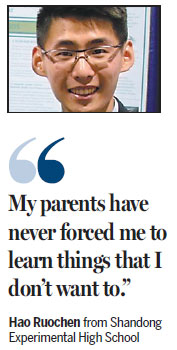A star is born as teen wins top global science competition
By Zhao Ruixue in Jinan (China Daily) Updated: 2015-06-30 07:51
Hao Ruochen may have his head in the stars, but the 17-year-old also has a practical streak.
A "shining star" on his campus, Shandong Experimental High School, Hao won the top prize in the physics and astronomy category at the Intel International Science and Engineering Fair, held in the US city of Pittsburgh last month.
With research based on sound experiments involving the greater horseshoe bat, Hao stood out from about 1,700 young students selected from more than 75 countries at the fair, which is considered the world's largest high school science research competition.
As part of the prize for his achievement, a star will be named after him by the Lincoln Laboratory of the Massachusetts Institute of Technology.
"It takes a large amount of money to make star travel. If I had the money, I would prefer to spend the money doing scientific research and donating some to the primary school where I once worked as a volunteer teacher," Hao said.
Hao's research linked the important role that bats' ears play to research and development work of radar and smart antenna, said Zhuang Qiao, Hao's instructor and a professor of physics at Shandong Jianzhu University.
Zhuang praised Hao's research, but said he wasn't one-dimensional.
"He likes thinking and can put forward good questions," Zhuang said. "He has tastes in a wide range of fields, which helps him form a comprehensive view on the scientific work like the material he used for research."

The bat ear Hao used for his research work was printed using 3-D technology.
"I can get real data with the 3-D printed one while reducing the harm to bats as much as possible," Hao said.
Hao said the research came out of his keen interest in physics and the English version of the book Listening in the Dark: The Acoustic Orientation of Bats and Men.
"My parents have never forced me to learn things that I don't want to. They respect my choices," Hao said.
"When I told my mom that a star will be named after me, she told me to be calm, because after all I can't go to the star."
Hao is a member of several clubs, including micro filmmaking and robot development. Ruan Guilin, his adviser, praised his "high emotional intelligence" and assistance in organizing class activities.
During summer vacations in 2013 and last year, Hao volunteered to teach English at a primary school in Qumei, a town in Xigaze in the Tibet autonomous region. He started a nonprofit campaign to collect books and funds for students in Tibet.
He graduated from high school this year and has received university offers from Duke University, Pomona College, Yale-NUS College, Carnegie Mellon University and others.
Hao plans to attend Duke and continue his research on bats' ears.
zhaoruixue@chinadaily.com.cn
(China Daily 06/30/2015 page7)
- Govt encourages people to work 4.5 days a week
- Action to be taken as HIV cases among students rise
- Debate grows over reproductive rights
- Country's first bishop ordained in 3 years
- China builds Tibetan Buddhism academy in Chengdu
- Authorities require reporting of HIV infections at schools
- Typhoon Soudelor kills 14 in East China
- Police crack down on overseas gambling site
- Debate over death penalty for child traffickers goes on
- Beijing to tighten mail security for war anniversary







